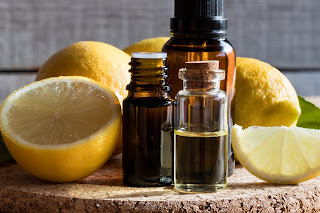With all the latest information about Covid-19 in the news, we may be spending more time at home away from work, crowds, or even school. The EPA says we normally spend about 90% of our time indoors.
Unless our windows are open, much of the time we are breathing in all types of indoor pollution, allergens, and germs. Indoor pollution can aggravate asthma, irritate our sinuses, cause congestion, and leave us feeling worn-out, tired, and, at the very worst, sick.
Here’s the good news: there are a few different ways to use essential oils to help protect us and clean/disinfect the air around us. When diffused or used as a room spray, essential oils are more than ‘a pretty face’.
They can help clean, deodorize, and purify the air in our homes and leave us breathing easier. Using the right essential oils, we can combat indoor pollution while simultaneously reaping the therapeutic rewards of clean, fresh, and healthy air.
Fortunately, we all have online access to a wide variety of antiviral, antifungal, and antibacterial essential oils. When used in various ways, they can help eliminate germs on your body, your belongings, and the surfaces in your home.
Essential Oils That Fight Germs
There are many essential oils with antimicrobial properties, and you can use them alone or in a combination of oils. Here are a few suggestions:
- Eucalyptus (eucalyptus globulus)
- Lavender (lavender angustifolia)
- Cinnamon (cinnamomun zeylanicuml) – should not be used around children under 6 years of age
- May Chang (litsea cubeba)
- Oregano (origanum vulgare)
- Thyme (thymus vulgaris)
- Tea Tree (melaleuca alternifolia)
- Clove (syzygium aromaticum) should not be used around children under 2 years of age
- Lemon (citrus limon)
- Rosemary (rosmarinus officinalis) should be avoided by women who are pregnant and children under 6 years of age
- Geranium (pelargonium graveolens)
There are scientific studies which indicate many essential oils contain antibacterial and/or antifungal properties. Among the oils listed above, Eucalyptus, Lavender, Lemon, and Geranium have antibacterial properties. The rest have antifungal properties as well.
Find a few oils that appeal to you and try blending them in different ways until you find a blend that suits you. Make a larger bottle and keep it on hand.
Methods for Using Oils
There are several ways you can use essential oil blends to clean your house air.
Diffuser
Use an electric diffuser or a tea candle diffuser (be sure to follow manufacturer directions). Mix a few drops into the diffuser to clean and disinfect the air. You can also use a cup of steaming hot water with the essential oils dropped into it.
Room Sprays
A simple room spray using water and essential oils is a great choice. Since water and oil do not mix, be sure to shake vigorously before using the spray. Spray high into the air to avoid furniture. Room sprays are great for getting stale smells out of rooms and cleaning the air.
Add 1/2 to 1 cup of water to a clean spray bottle (new if possible) and about 24 drops of your essential oil blend. Tea Tree/Lemon/Eucalyptus is a highly fragrant blend that helps your rooms smell clean and fresh.
Tissue
You can also use a couple drops of your favorite essential oil or essential oil blend on a (paper) tissue and inhale as needed.
A Few Suggested Blends for Cleaning the Air
- Eucalyptus/Lavender – smells good and helps you relax, too!
- Eucalyptus/Geranium
- Eucalyptus/Lemon
- Eucalyptus/Lemon/Thyme
- Lavender/Geranium/Lemon
- Clove/Cinnamon/Thyme
- Tea Tree/Lemon
Essential Oil Precautions
If you live in the same space as a pregnant or breastfeeding woman, you should not use any essential oil in any amount. It is still unknown how exactly essential oils can affect pregnant women, so it’s best to avoid using them during pregnancy to be safe.
You also should not use essential oils on children, especially those younger than seven years old. Essential oils can be quite powerful, and it’s possible that children have not yet developed a resistance to the more intense effects.
Do not apply essential oils directly to the skin. Always use a carrier oil and blend before application.
Purifying your indoor air is important to your health and is easy to do. You can take a proactive approach and find a natural, safe, and proven alternative using natural essential oils. Let these antiviral, antifungal, and antibacterial essential oils help keep harmful microbes at bay.
How do you purify your home air? Do you use essential oils? What method have you tried? What results have you noticed? Please share your experience with our community.
Let's Have a Conversation!
© 2020 Kathleen Cumberland/DancingDingo.com. All rights reserved.
Kathleen Cumberland is a natural skincare business owner, aromatherapist and business coach. Her focus is on helping people stay happy and healthy. Check out www.DancingDingo.com




No comments:
Post a Comment
Tell us what you think, and please keep it clean!